|
|
TODAY.AZ / Business
Past and future of thriving Turkish economy: analysis by MUSIAD board member
06 July 2023 [12:30] - TODAY.AZ
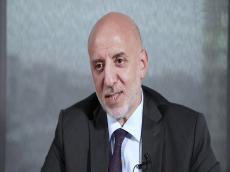
By Azernews
Within 20 years under the AKP government, so to say, the world witnessed miracles in the Turkish economy. The development covered all sectors from agriculture to tourism. The export increased by 4 times amounting to $254bn in 2022, Turkiye turned from a cheap-hand-labor producer to the manufacturer of a cutting-edge and sophisticated product.
However, in parallel to the said achievements, Turkiye has struggled with devaluating the national currency Lire for ten years. Many from the opposition in Turkiye used to link it with heterodox economical views and politics of AKP because the Turkish Central Bank has refused to raise the rates for the last two years. It seems the AKP government could not resist the criticism long and changed the governor of the Bank right after the general election held in May 2023. The new governor Hafize Gaye Erkan raised the rates of interest, but the depreciation of the Lira is continuing contrary to expectations. So, does it mean that the rates of interest do not play a big role in stabilizing of national currency?
Speaking to Azernews on the issue Ünsal Sözbir, the MUSIAD board member and former banker, noted that in order to understand the current macroeconomic situation of Turkiye, it would be useful to look at it from a ten-year perspective, in which domestic and foreign political, economic, social and health events have been very intense.
GDP (GDP) Growth
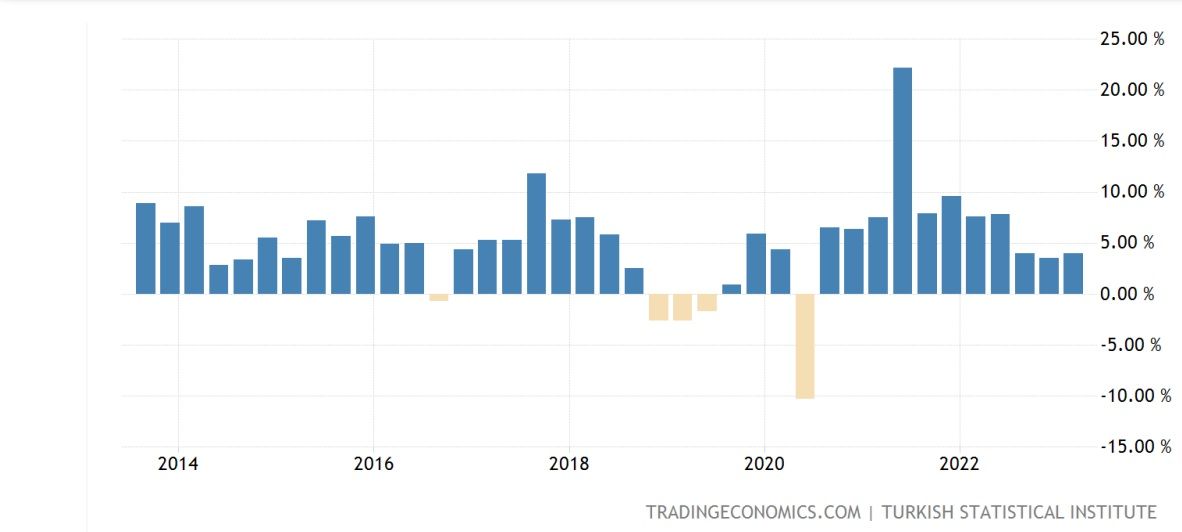
With reference to the table given above and below, he noted that in total the Turkish economy has enhanced for ten years, except five times - one after the coup attempt in 2016, three after the Priest Crisis with the United States in 2018, and one in 2020 to have a Pandemic effect.
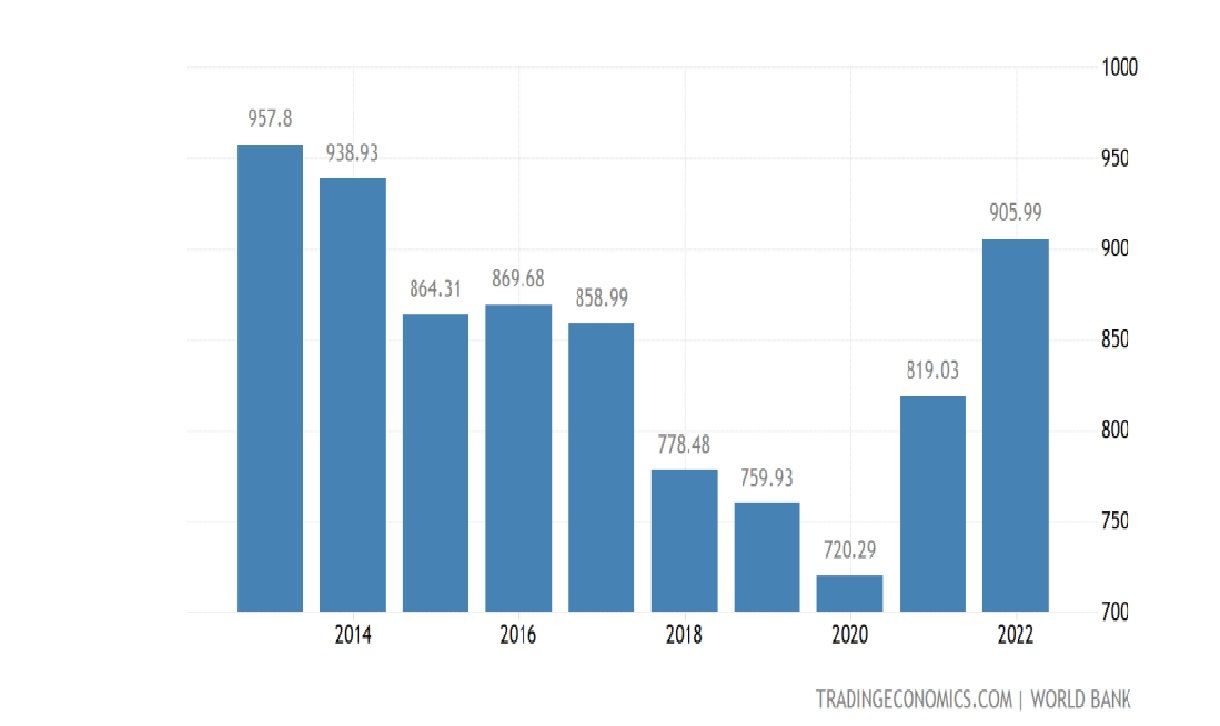
“As can be seen from this table, annual GDP, which was $957bn in 2013, fell to $720bn in 2020 and increased to $906bn again in 2022. Although the Turkish economy has grown in every period except for five quarters, the main reason for the decrease in total GDP in USD is the inflation experienced in the country, and the sudden and rapid movements in the exchange rate,” Ünsal Sözbir said.
As for ten-year developments in the Monetary Policy Phase Rate and Inflation in the Exchange Rate, the Former Banker provided the table demonstrating the value of the Turkish Lira against the US dollar.
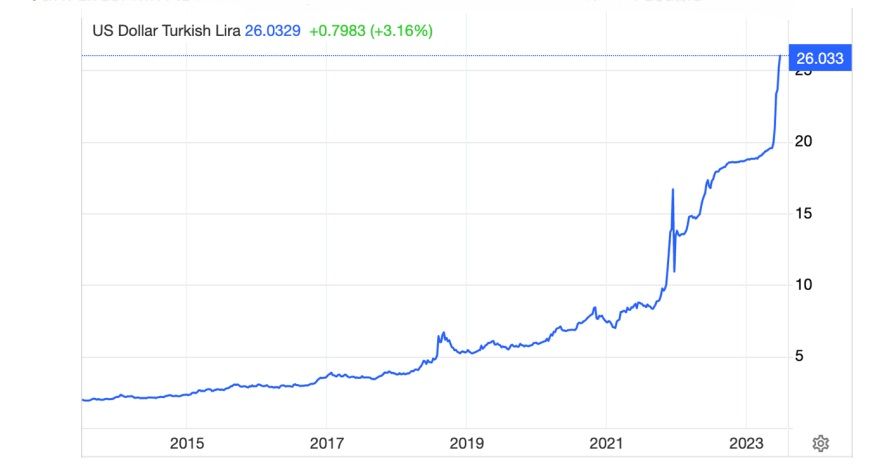
He recalled that the world entered a period when monetary expansionary economic policies were implemented to relieve the economic squeeze caused by the Lehman Brothers Investment Bank in 2009, and there were statements that these policies would be terminated when the protests against the Government in Turkiye in 2013.
“After this period, when inflation and interest rates were stable, Turkiye entered a very active period with the influence of domestic and foreign political and economic developments. Judicial investigations were initiated against four ministers and many businessmen in December 2013, elections and the attempted Military Coup of July 15, 2016, such as the political and economic consequences of the events that followed one another have shown themselves severely, and the Constitutional amendment made in 2018 has switched to the Presidential Administration System in Turkiye,” the Former Banker noted.
He pointed out that on the one hand, Turkiye has experienced a period in which the decisions are taken in order to establish and operate the new management system, and on the other hand, the political tensions with the USA, as well as the economic developments, the effects of which have been seen so far, and to eliminate the negative consequences of these developments.
"One of the most important decisions taken at that time was the narrowing of the TL SWAP limits to prevent the Turkish Lira from being subject to speculative movements. Charge-offs by international financial institutions that invested in Turkish lira assets at that time have triggered reactions to date. The outflow of foreign funds from Turkiye accelerated due to the narrowing of SWAP opportunities and Turkiye's international credit rating being below investment grade; the share of foreigners in government domestic debt securities decreased below 1 percent, and in Borsa Istanbul (BIST) from 65 percent to less than 30 percent. In other words, the share of foreign investments, which are called portfolio investments, declined to historical lows," he noted.
He said credit volumes were expanded under the leadership of Public Banks with the resources created by monetary expansion, in other words, the increase in the emission volume of the CBRT and the decrease in external resources from internal and external resources which is necessary for the functioning of the economy. He underlined that since this expansion made at that time was not sufficiently selective, it caused resources to be spent on consumption and asset purchases such as automobiles and housing, which did not have a direct effect on production, and on the other hand, it led to a tendency to foreign currency, which has been under pressure for a long time.
At this point, it would be useful to present the 10-year table of Policy Interest Rates, which determines the cost of the resource transferred from the Central Bank to the banking system.
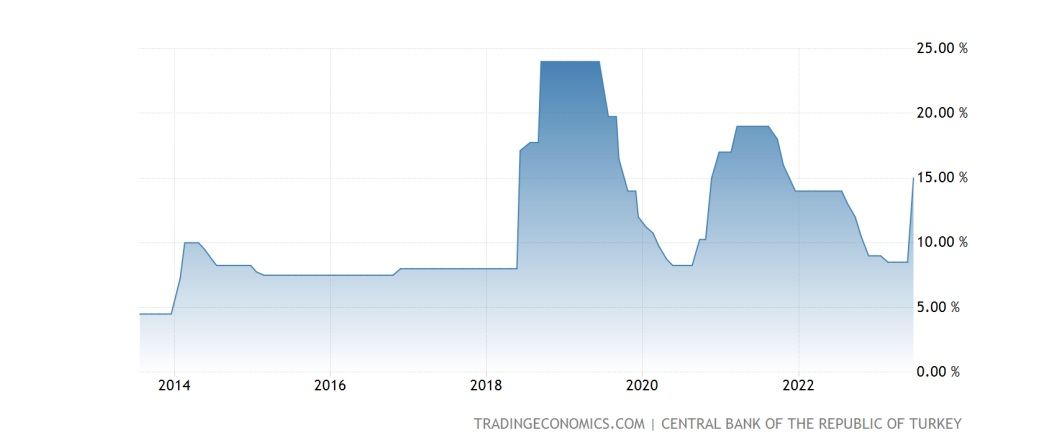
In order to understand this table correctly, the graph showing the consumer inflation covering the same period is also given below.
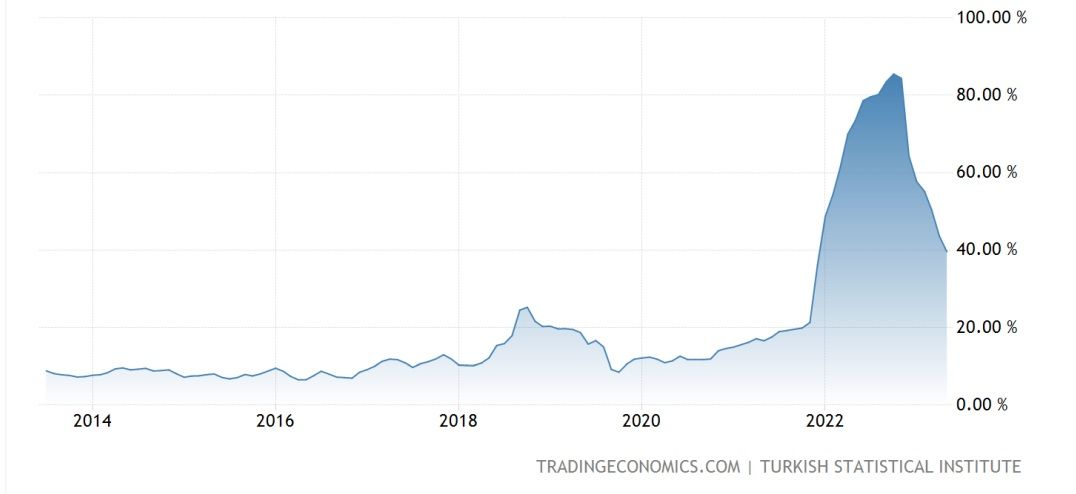
"The most obvious result that emerges when evaluating the three tables showing the exchange rate, the policy interest rate, and consumer inflation together is that the policy interest rate has completely disconnected from inflation and exchange rates, especially in the last two years. If it is necessary to interpret this result from a different perspective, the resources that the government mainly gave to public banks to increase production and exports went to consumption and foreign exchange, triggering inflation and the exchange rate upwards," he said.
He noted that the increasing policy interest rate from 8.5 percent to 15 percent on June 22, 2023, by the Central Bank should be understood first as a serious shift in the management of the macroeconomy. The new Government and the new Minister of Treasury and Finance have been given authority in this regard.
"Secondly, after a long hiatus, it started to use the “policy interest rate”, which is one of the most important weapons of monetary policy. Thirdly, interest rates may continue to be increased in the upcoming Monetary Policy Committee meetings, depending on the upcoming developments," he emphasized.
Besides, he noted that they are the first and strong signals that the interest rates given by the banks while collecting funds and the interest rates applied by the Central Bank will converge.
He also touched on the reason why the interest rates are not increased at a high rate at once is that banks do not get into financial difficulties, especially due to the low-interest government papers and loans held by the banks. As it is known, in the last interest increase, many banks in the USA and Europe were in trouble for this reason.
"With the increase in interest rates, the first signals were given that they would attach importance to Financial Stability as well as Price Stability, which is the main duty of the Central Bank. The practice of keeping the exchange rates under pressure was partially abolished. We say partial because there is a serious burden on the public due to the FX-protected lira deposit scheme (KKM) developed in December 2021 to reduce the demand for foreign currency. Reducing the attractiveness of KKM in the banking system will be possible with the balance of exchange rates. Time is needed here," he said.
He underscored that the rapid depreciation of the Turkish Lira by up to 25 percent should be seen as a step towards breaking the interest in foreign currency on the one hand, and regaining the markets lost in exports, on the other. However, the promises given during the election period turned into costs from expectations, especially the minimum wage hike, and the developments that triggered inflation point to a higher equilibrium point in the policy rate and exchange rate.
"The performance to be achieved in service exports, especially tourism, in the summer months will be effective in determining the exchange rate increases, inflation, and the policy interest rate that will balance them in the upcoming period. Local Administration Elections to be held in March 2024 prevent radical decisions. Therefore, smoother transitions are expected. The reaction of the markets to the decisions taken and the economic management is extremely positive. The $8.5bn improvement in the international foreign exchange reserve in one week is the most important signal of this. Positive steps that can be taken in the inflow of foreign resources will contribute to the lowering of exchange rates, and then to the reduction of inflation. Therefore, foreign contacts and “trust”, which means a stable ground for foreign investors, will be the most important agenda item of the Government," he added.
URL: http://www.today.az/news/business/236755.html
 Print version
Print version
Connect with us. Get latest news and updates.
See Also
- 18 February 2025 [15:21]
2025 Agrarian Business Festival to kick off in Imishli - 18 February 2025 [13:18]
Azerbaijan, Qatar central banks discuss strengthening cooperation - 18 February 2025 [12:43]
Shah Deniz Compression Platform to be Azerbaijan's 1st unmanned facility - 17 February 2025 [13:19]
Caspian Economic Forum kicks off in Tehran with regional trade and transport on agenda - 17 February 2025 [12:21]
Azerbaijan and IsDB discuss expanding cooperation in Islamic finance - 17 February 2025 [10:49]
OTS to hold key summits in Azerbaijan in 2025 - 14 February 2025 [15:58]
Major reconstruction of M3 highway near Bilasuvar completed - 14 February 2025 [12:56]
ASAN Service signs 25th service model agreement, expands to Colombia - 14 February 2025 [12:37]
Azerbaijan's last kolkhoz transformed into Ivanovka agro-park - 13 February 2025 [14:59]
Azerbaijan, ADB discuss urban development cooperation
Most Popular
 Turkiye's Grand National Assembly to discuss intergovernmental gas cooperation agreement with Azerbaijan
Turkiye's Grand National Assembly to discuss intergovernmental gas cooperation agreement with Azerbaijan
 Chief of the Armenian General Staff also became blogger
Chief of the Armenian General Staff also became blogger
 President Ilham Aliyev: Relations of friendship & cooperation between Azerbaijan and Lithuania have good traditions
President Ilham Aliyev: Relations of friendship & cooperation between Azerbaijan and Lithuania have good traditions
 China urges Europe to uphold free trade and cooperation at Munich Security Conference
China urges Europe to uphold free trade and cooperation at Munich Security Conference
 Third Caspian Economic Forum advances regional cooperation and global security
Third Caspian Economic Forum advances regional cooperation and global security
 Azerbaijani and Romanian FMs discuss strategic partnership and regional cooperation
Azerbaijani and Romanian FMs discuss strategic partnership and regional cooperation
 US, Russian officials allegedly to meet next week
US, Russian officials allegedly to meet next week
